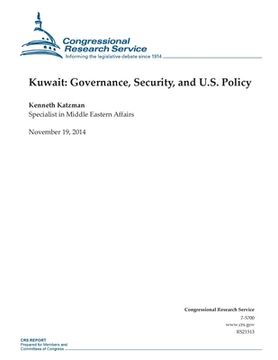Kuwait: Governance, Security, and U.S. Policy (en Inglés)
Reseña del libro "Kuwait: Governance, Security, and U.S. Policy (en Inglés)"
Kuwait has been pivotal to U.S. efforts to secure the Persian Gulf region because of its willingness to cooperate with U.S. strategy and military operations in the region, its location close to both Iran and Iraq, and its role as the object of past Iraqi aggression. Kuwait arguably became even more central to the U.S. ability to project power in the northern Persian Gulf when all U.S. combat troops left Iraq in 2011. Kuwait has helped Iraq reintegrate into the Arab world; it is supporting U.S. efforts to contain Iranian power and enforce Iran sanctions; and it is procuring missile defense technology that furthers the U.S. goal of a GCC-wide missile defense network. Still, as demonstrated by the Amir's May 2014 visit to Iran, Kuwait maintains relatively normal economic and political relations with Iran so as not to provoke the Islamic Republic. Kuwait is supporting U.S.-led efforts to defeat the Islamic State organization in Iraq and Syria by placing its airbases and other military facilities at the disposal of the U.S.-led anti-Islamic State coalition-even though Kuwait is not itself participating in coalition military operations against the group. Yet, U.S.-Kuwait differences have emerged over what U.S. officials say is Kuwait's inability to stanch the flow of private Kuwaiti funds to extremist Islamist groups fighting in Syria. Kuwait's government supports the Sunni-led rebellion in Syria with humanitarian aid only. On other regional issues, Kuwait generally acts in partnership with its allies in the Gulf Cooperation Council (GCC). In March 2011, Kuwait sent naval forces as a largely symbolic participation in GCC military intervention to help Bahrain's government suppress an uprising by the majority Shiite population. Kuwait's leadership, along with that of Saudi Arabia and UAE, sees the Muslim Brotherhood organization as a domestic threat, and all three countries supported the Egyptian military's July 2013 removal of elected president and senior Muslim Brotherhood leader Mohammad Morsi from power. Kuwait has tended to defer to GCC leader Saudi Arabia and other GCC states in offering proposals to resolve the Israeli-Palestinian dispute, while expressing residual resentment of Palestine Liberation Organization (PLO) officials for supporting Saddam's invasion of Kuwait. Domestically, Kuwait's political system was in turmoil during 2006-2013, initially manifesting as parliamentary opposition to Sabah family political dominance but later broadening to visible public unrest in 2012-2013. Disputes over the ruling family's power and privileges produced repeated constitutional dissolutions of the all-elected National Assembly and new elections, the latest of which were held on July 27, 2013. The July 2013 elections produced a pro-government Assembly more amenable to working with the ruling family, ushering in a period of renewed legislative and governmental action on long-standing issues and an end to most public protest. Yet, the ruling family has not necessarily eliminated the causes of the unrest. Kuwait remains a relatively wealthy society, where most citizens do not want to risk their economic well-being to try to bring about the downfall of Al Sabah rule. The government has reduced unrest by implementing budgets replete with subsidies and salary increases, and undertaking some repressive measures such as imprisoning or revoking the citizenship of social media critics for "insulting the Amir." These measures have tarnished Kuwait's reputation as the most politically progressive of the GCC states. The years of political paralysis also have contributed to economic stagnation relative to Kuwait's more economically vibrant Gulf neighbors such as Qatar and the United Arab Emirates (UAE).

